In an open letter to Iranian President Hassan Rouhani, the International Press Institute (IPI) appealed for respect of international press freedom standards in the case of 2014 IPI World Press Freedom Hero Mashallah Shamsolvaezin, who is set to appear before Tehran’s Revolutionary Court on Nov. 29 on charges of ‘propaganda against the state’.
The charges were levied after Shamsolvaezin made public speeches urging the government to release imprisoned journalists in Iran at the IPI World Congress in Cape Town, South Africa on April 15, 2014, and during the Center for Defending Freedom of Journalists’ Forum for Media Freedom Defenders in Amman, Jordan, held from May 8 to 11, 2014.
In August this year, six UN Human Rights Experts, including the UN Special Rapporteur on extrajudicial, summary or arbitrary executions, Christof Heyns and the Special Rapporteur on the promotion and protection of the right to freedom of opinion and expression, David Kaye, issued a joint statement expressing “grave concern over the recent escalating trend of arrest and sentencing of individuals exercising their rights to freedom of expression and opinion, peaceful assembly and association”
The UN Special Rapporteur on the situation of human rights in the Islamic Republic in Iran, Ahmed Shaheed, further noted that the news media community in Iran experienced a particularly harsh crackdown in June and July of this year, during which dozens of journalists and civil society activists were summoned to face charges of “conspiracy against national security,” “propaganda against the regime,” “propaganda against the state” or similar sedition charges.
Shamsolvaezin is a prominent Iranian journalist, who served as editor and in some cases founder of several major post-revolutionary reformist newspapers in Iran, including Jame’eh, Tous, Neshat, and Asr-e Azadegan, which were all eventually closed by Tehran’s Press Court. He was jailed multiple times during his career as a result of his journalistic activities, famously in September 1999 when he penned an article condemning capital punishment that led to the shuttering of Neshat. Today Shamsolvaezin serves as spokesperson for the Iranian Committee for the Defense of Freedom of the Press and spearheads the effort to re-open Iran’s disbanded Association of Journalists.
Shamsolvaezin was barred from leaving Iran on on June 21. On June 29 he was summoned to Evin Prison Court and notified of the sedition charge and the Nov. 29 court date. After being released on bail in July, he wrote on his Facebook page about the summons, “I did not accept the charges. I said propaganda against someone needs to have both material and non-material elements, both of which I lack. I am a journalist, and criticizing things within the framework of the law is a natural tool of my profession.”
Dr. Hassan Rouhani
President of the Islamic Republic of Iran
Tehran
C/O Mr. Hassan Tajik
Ambassador of the Islamic Republic of Iran
Embassy of the Islamic Republic of Iran
Jaurésgasse 9
1030 ViennaAustria
Vienna, Nov. 18, 2014
Your Excellency,
I am writing to you today on behalf of the International Press Institute (IPI), a global network of publishers, editors, and leading journalists in over 120 countries, to express our concern regarding the upcoming appearance of Mashallah Shamsolvaezin before the Revolutionary Court on Nov. 29, 2014.
Mr. Shamsolvaezin was summoned to appear before the Evin Prison Court on June 29, 2014 on charges of ‘propaganda against the state,’ in connection with speeches and interviews he gave during the IPI World Congress in Cape Town, South Africa from April 12 to 15 2014 and at the Center for Defending Freedom of Journalists’ Forum for Media Freedom Defenders held in Amman, Jordan from May 8 to 11, 2014. On June 21, 2014, he was notified of a travel ban that forbids his leaving Iran.
IPI honoured Mr. Shamsolvaezin as its 2014 World Press Freedom hero because of his internationally celebrated status as a fearless advocate who has promoted quality journalism in Iran. He is a seasoned professional who has acted as spokesman for the Iranian Committee for the Defense of Freedom of the Press, formerly as vice president, and now as the head of the Association of Iranian Journalists (AIJ).
IPI recalls your comments in support of AIJ during your first news conference as president elect, when you stated: “I believe that not only that association but all associations should be revived legally because these organizations are the best tools to manage the issues of society and the management of social issues must be carried out through these very professional and trade associations and groups. I will put my efforts into this.”
In October 2014, a group of U.N. experts, including U.N. Special Rapporteur on Freedom of Expression David Kaye, condemned sedition laws that prevent diverse political opinions from being openly debated. IPI is saddened to see charges alleging ”propaganda against the state” used in the case of Mashallah Shamsolvaezin, and in the cases of other journalists indicted and imprisoned in Iran, in order to stifle free political debate in the media.
Journalists serve a vital role in any democracy by critically assessing political situations to benefit the public interest. IPI respectfully requests that you ensure the Islamic Republic of Iran reflects its commitment to human rights by acting in accordance with its obligations under international standards, including the civil and freedom of expression rights enshrined in the International Covenant on Civil and Political Rights (ICCPR). This can be accomplished by dropping the charges against Mashallah Shamsolvaezin, and releasing all journalists who have been imprisoned in Iran simply for reporting on matters that are in the public interest.
Thank you for your kind attention in this matter. We look forward to working with you to ensure that press freedom in the Islamic Republic of Iran is protected for the benefit of all Iranians.
Yours sincerely,
Alison Bethel McKenzie
Executive Director
The International Press Institute (IPI)


